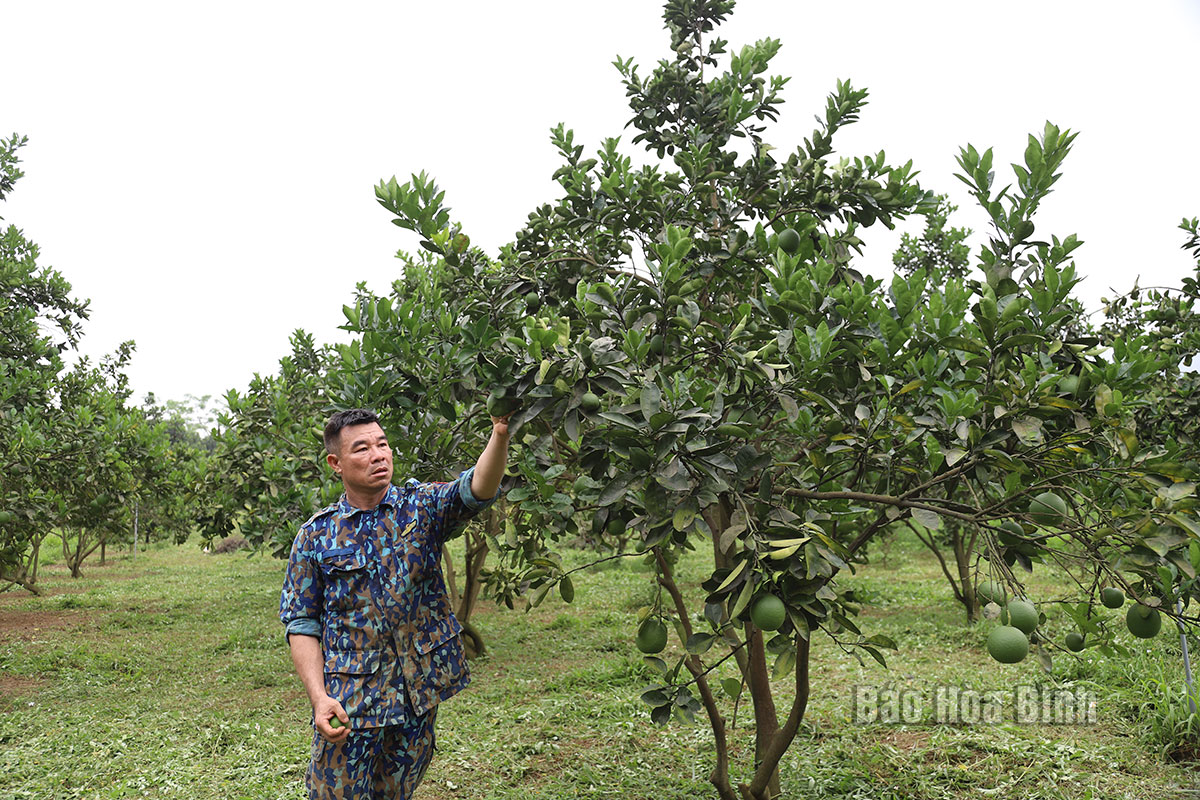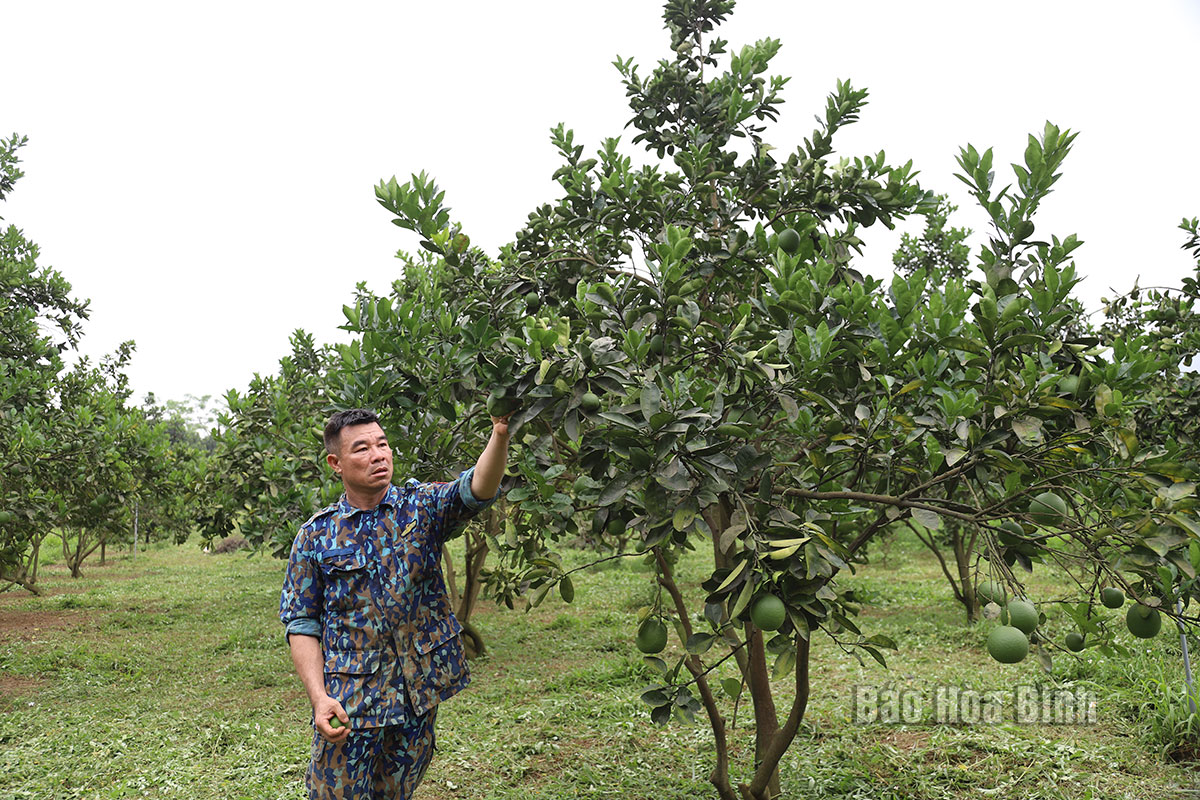
(HBO) – Hau Nhat farm in Hang Tram town in Yen Thuy district has more than 3,000 grapefruit trees and thousands of chickens.
The farm owner Ta Huu Hau said that he applied organic farming,
mainly using organic fertiliser, techniques, and experiences to limit
pests and diseases. Thanks to building a brand of clean agricultural products,
his products such as meat, grapefruit, and jackfruit are welcomed much in the
market.
Hau Nhat farm in Hang Tram town, Yen Thuy district.
In recent years, Yen Thuy's agricultural sector has developed with
breakthroughs. The agricultural structure has changed to promote its
advantages, matching market demands and adapting to climate change. The value
of agriculture, forestry, and fisheries is estimated at nearly 1.8 trillion
VND, accounting for 27.2% of the district’s economic structure.
According to the district’s Department of Agriculture and Rural Development,
its total annual cultivation area reaches nearly 13,000 ha including 339 ha of
medicinal plants. Restructuring the agricultural sector, and transforming the
crop structure have initially made positive changes. Mechanisation in agriculture
is applied in over 85% of all stages - growing, harvesting, and storing. Crop
structure and new plant varieties are used to fit the climatic and soil
conditions.
Along with cultivation, the district’s livestock industry has made good
progress with the production value in 2022 reaching nearly 640 billion VND,
accounting for about 37% of the agricultural sector. Livestock production
continues to actively shift from small-scale and household farming to bigger
farms with measures applied to control diseases and ensure environmental
safety. The district also maintains vaccination, quarantine, slaughter control,
and disinfects to prevent major epidemics.
Aiming to develop sustainable agriculture, Yen Thuy district is paying
attention to having agricultural products certificated or meet the requirements
of the One Commune-One Product (OCOP) programme.
Currently, the district has products that have been granted
trademark protection titles by the National Office of Intellectual Property
under the Ministry of Science and Technology, for example, grapefruit, onion,
taro, Green squash, and 17 OCOP products.
The district authorities also paid attention to brand building
and product promotion, and increased support for production-consumption
linkages.
It also promotes the formation of new-styled cooperatives associated with the
value chain. Up to now, the whole district has over 39 agricultural
cooperatives, and 37 cooperative groups with 537 members, creating more than
800 jobs.
Moreover, Yen Thuy district maintains production and consumption links on over
400 ha of raw cane with Viet Dai Sugar Company; about 25 ha of ca gai leo
(Solanum procumbens) with Bao Hieu Agriculture and Forestry Cooperative; 20 ha
of grapefruit between Ngoc Luong Agricultural Cooperative and Dai Dong
Agricultural Cooperative.
Particularly, Dai Dong Agricultural Cooperative in Ngoc Luong
Commune and RYB joint Stock Company cooperated to export over 11 tonnes of Dien
grapefruit to the UK market. The district also has mechanisms and policies to
attract investors to build processing facilities for agricultural products in
the locality.
According to data from the Hoa Binh Provincial Party Committee, the industrial production index for the first six months of 2025 is estimated to have increased by 20% compared to the same period last year. This marks the highest year-on-year growth rate for this period since 2020.
In the first six months of 2025, Hoa Binh province’s export turnover was estimated at 1.145 billion USD, marking an 18.11% increase compared to the same period in 2024. Import turnover was estimated at $ 804 million, a 17.15% increase, which helped the province maintain a positive trade balance.
The lives of the ethnic minority farmers in Tan Lac district have gradually improved thanks to the new directions in agricultural production. This is a testament to the collective strength fostered through the professional associations and groups implemented by various levels of the district’s Farmers’ Union.
With the motto the "product quality comes first,” after nearly one year of establishment and operation, Muong village’s Clean Food Agricultural and Commercial Cooperative, located in Cau Hamlet, Hung Son Commune (Kim Boi district), has launched reputable, high-quality agricultural products to the market that are well-received by consumers. The products such as Muong village’s pork sausage, salt-cured chicken, and salt-cured pork hocks have gradually carved out a place in the market and they are on the path to obtaining the OCOP certification.
In the past, the phrase "bumper harvest, rock-bottom prices" was a familiar refrain for Vietnamese farmers engaged in fragmented, small-scale agriculture. But today, a new spirit is emerging across rural areas of Hoa Binh province - one of collaboration, organisation, and collective economic models that provide a stable foundation for production.
Maintaining growing area codes and packing facility codes in accordance with regulations is a mandatory requirement for agricultural products to be eligible for export. Recently, the Department of Agriculture and Environment of Hoa Binh province has intensified technical supervision of designated farming areas and packing facilities to safeguard the "green passport" that enables its products to access international markets.



